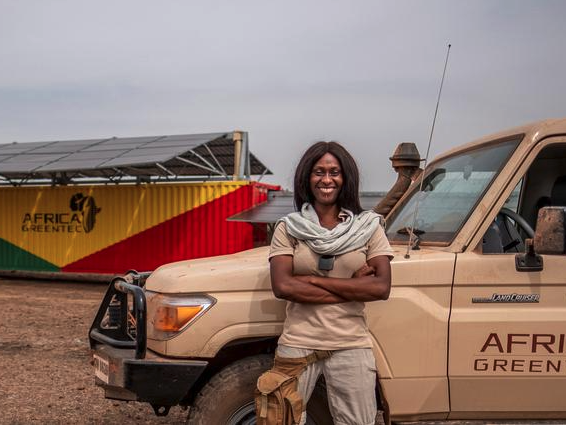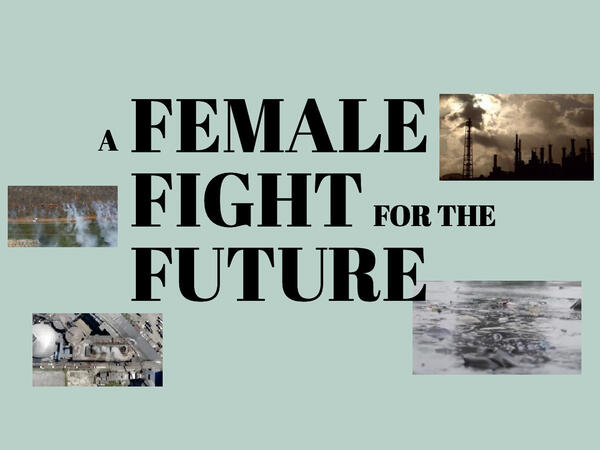Confronting catastrophe:
"In the end, if we do nothing, it will cost us everything"
While one climate report after another warns of the fatal consequences of rapid global warming, countries like Uganda are already bearing the brunt of the climate crisis. Prolonged droughts, flooded cities and disappearing ecosystems are depriving people of their livelihoods.
Yet Uganda emits hardly any CO₂, just 0.1 tonnes of CO₂ per capita per year. In Germany, the figure is 9.1 tonnes. Since the year 1750, Germany has emitted 92.6 billion tonnes of CO₂, Uganda only 0.1 billion tonnes. It is the industrialised nations that trigger climate change, but it is countries like Uganda that feel it.
Women suffer particularly badly, mostly due to the fact that they are scoially disadvantaged and usually have less power. Despite these hurdles, there are a growing number of mainly young women in Uganda who are fighting against the advancing climate crisis. They are trying to make a better future possible: Fridays for Future activists, NGO workers, feminists. Each is fighting in her own way. We spoke to eight of them and wrote down what they are fighting for.
Aidah Nakku Fridays for Future activistCommitted to the education of girls and women. For her, this is the most important weapon against the climate crisis.
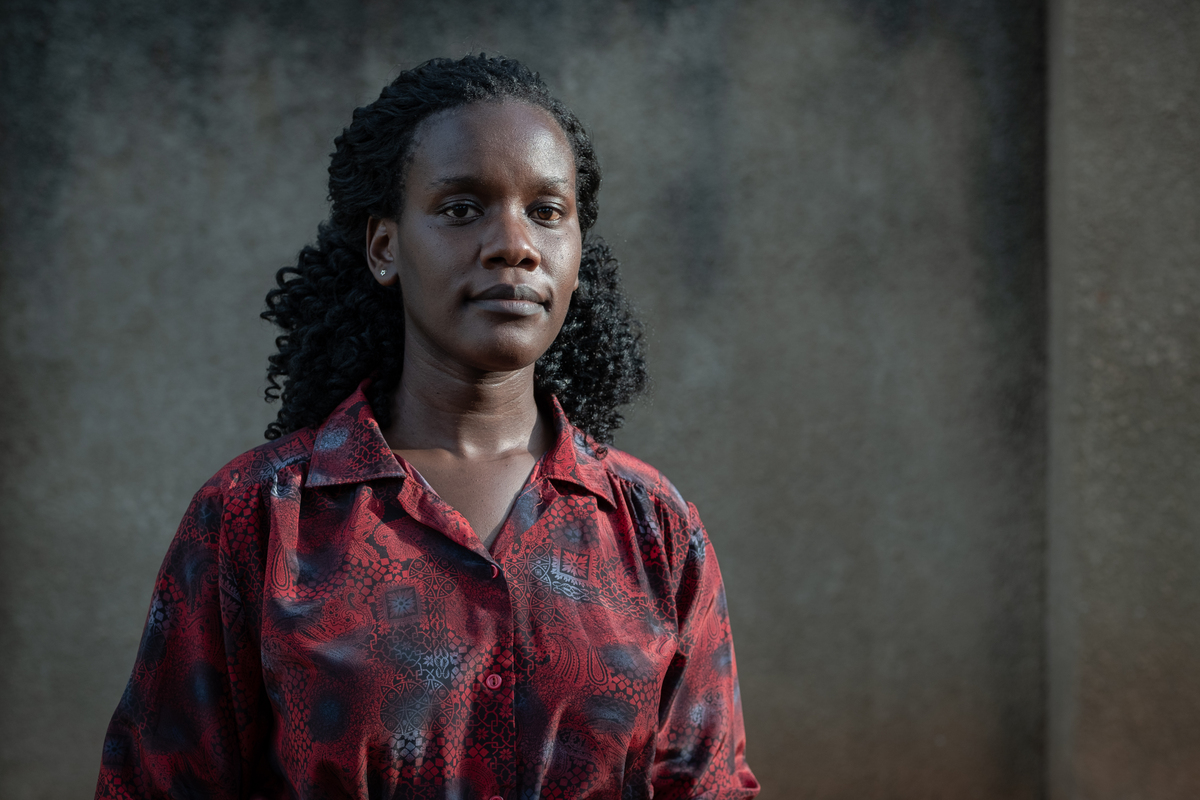
Aidah Nakku crosses her arms in front of her body, her gaze toward the camera is serious: “An increase in global temperature leads to a higher risk of premature birth,” is written on a cardboard placard she is holding in her hands. With this portrait photo on Instagram, the 24-year-old from Kampala wants to draw attention to a problem: The climate crisis hits women and girls particularly hard. Aidah Nakku has always been passionately interested in gender issues, she says. Her fight against the climate crisis is also one against discrimination and violence against women. In her home country Uganda, gender equality has been enshrined in the constitution since 1995. But the reality is often different: Girls leave school earlier than boys because they have to take on tasks in order to provide for the family.
According to statistics from the United Nations Children’s Fund, 40 percent of girls are married off before the age of 18. Maternal mortality is also high: 375 women die for every 100,000 live births. Climate change is exacerbating the marginalisation of women and girls, says Aida Nakku. She points to UN figures showing that 80 per cent of people displaced by climate change are women. In the global South, she says, women are responsible for collecting firewood and water. In the face of climate change, they have to struggle more to access resources. “This also puts them at higher risk of gender-based violence,” says Nakku.
Last May, she graduated in economics, she now works as a consultant. As a gender and climate activist with Fridays for Future, she is not only active on social media in her spare time, but also supports actions on the ground. At the moment, she is helping to collect donations for a project aimed at young women and girls in a village in Kayunga district, which was affected by floods in September 2021. A group of girls will now be taught how to sew, among other things, so that they can later provide for themselves.
More education for girls is a tool to reduce emissions of climate-damaging greenhouse gases, says Nakku. The climate protection initiative Drawdown, for example, assumes that CO₂ emissions could be reduced by up to 85.4 gigatonnes by 2050. More knowledge also helps women cope better with climate shocks. “Education is one of the most effective tools against the climate crisis,” says Nakku. “We need to empower girls to become good stewards of soil, trees and water as natural cycles change.” She also wants to encourage women to speak out - and demand immediate climate action.
Susan Nanduddu Executive Director of an NGOShe fears the caprice of the Ugandan government, yet she still cooperates with it.
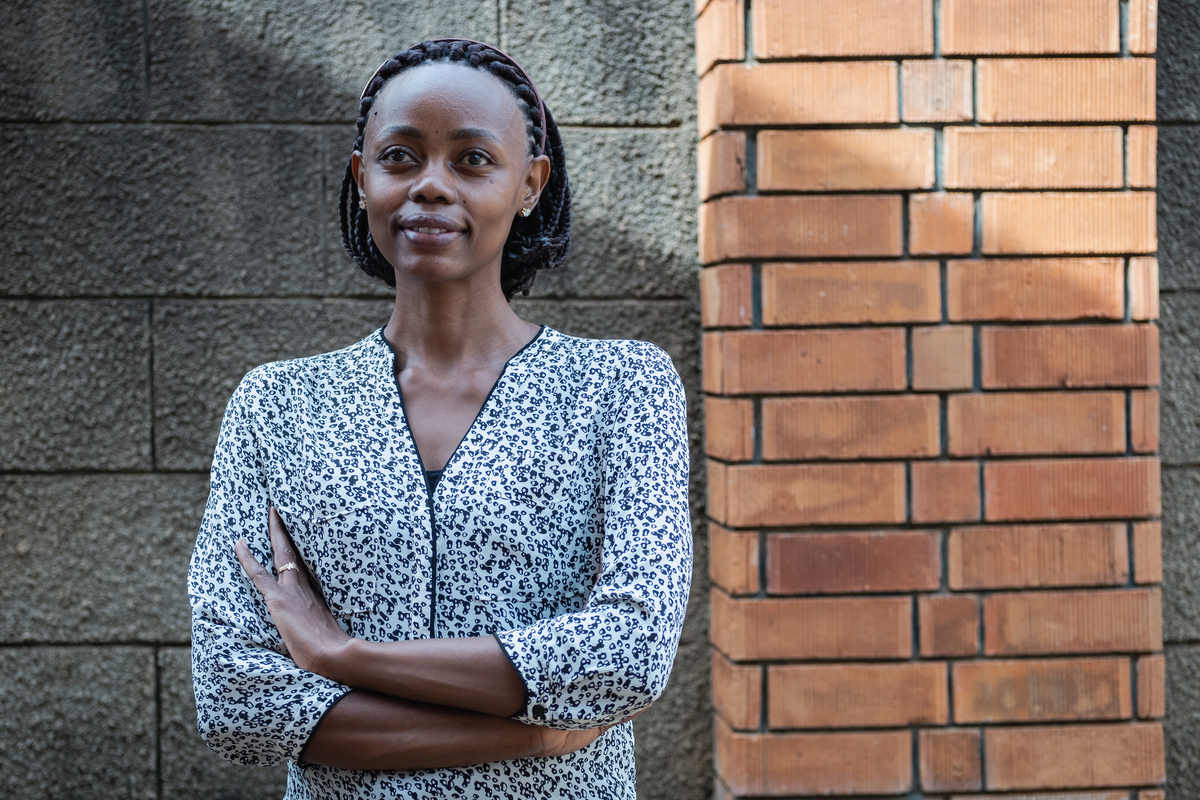
She has been lucky. So far. Susan Nanduddu is the executive director of the African Center for Trade and Development, or ACTADE. It is one of the few Ugandan NGOs that have not yet been targeted by political despotism. Tens of thousands of NGOs were blocked in 2019, and 54 more last year. The reasons often appear to be pretexts, mostly allegedly bureaucratic. Others are even accused of terrorism or money laundering. Those affected see the actions as an attempt to intimidate and control civil society.
But Nanduddu, 39, does not want to be intimidated, she says in the video call. Nevertheless, she is also afraid of a possible closure of ACTADE. That is why she works together with Ugandan politicians. For example, on the Climate Change Act, which she helped to draft as a member of the National Advisory Committee on Climate Change. Nanduddu, who has a degree in development science, depends on politicians to implement her ideas.
Nanduddu trusts in it, in the good. That in Uganda, the country that ranked 144 out of 180 in the global corruption comparison, there are politicians who are committed to real improvements.
For fear of the state’s heavy hand, the NGO keeps a low public profile and does not explicitly oppose the planned EACOP oil pipeline through Uganda. Oil production is sold by Uganda’s government as a miracle cure for the country’s economy. Nanduddu dares to make a harsher assessment: “The project is irresponsible. Uganda should not put its environment at risk.” She risks a lot with such statements. But the threat of climate change is too serious to withdraw from the fight, says Nanduddu.
Hamira Kobusingye Health activistShe has learned that environmental and health disasters are directly linked.
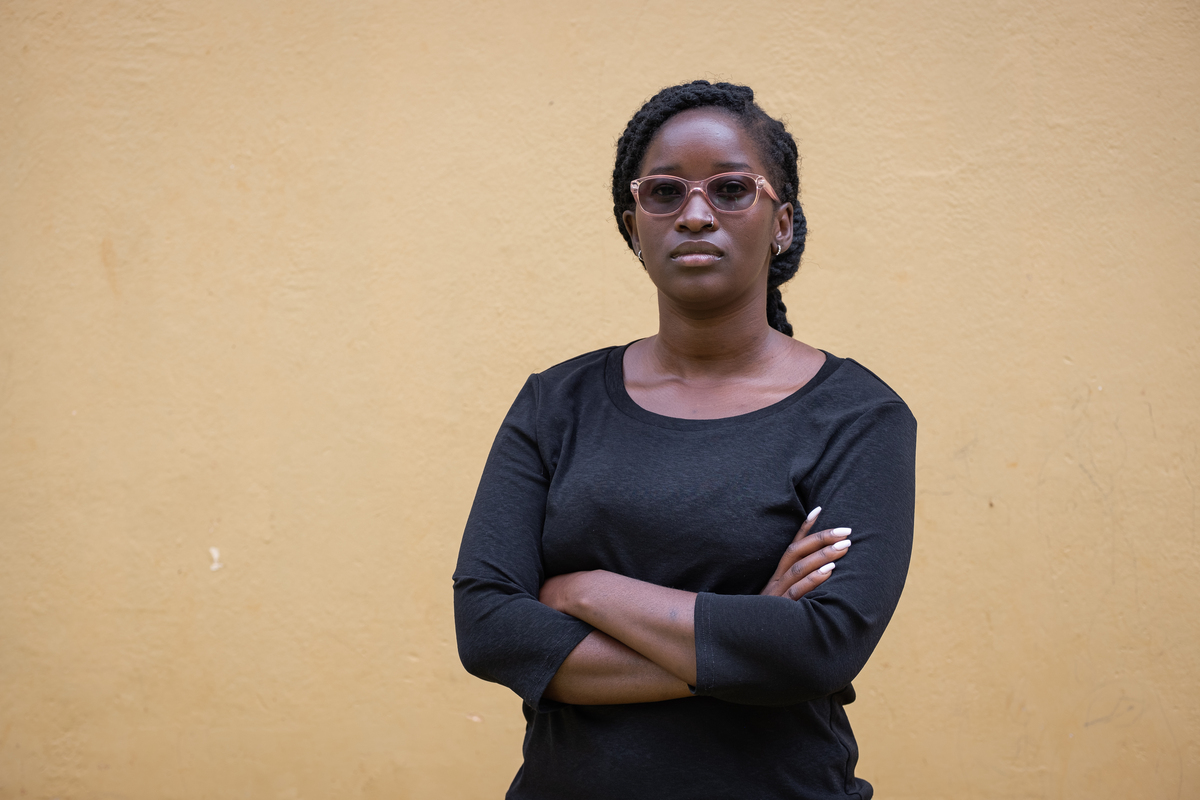
She learned early on to learn from the mistakes of others. Or else you don’t survive long in the slum. Hamira Kobusingye grew up in Kireka, a poor suburb in Kampala, the capital of Uganda. It is overpopulated, with houses made of tin roofs and limited waste disposal or access to education. The worst thing, says Kobusingye today, 26 years old, was to see how floods destroyed the food that had been painstakingly planted.
This still influences her activism today. The people in the slum feel the real consequences of climate change directly. Long dry spells followed by sudden rainfall destroy people’s homes and allotments. Kobusingye says: “Those who grow up in the slums develop skills to survive disasters.”
She herself owes her education to her mother. She worked as an HIV counsellor in the family home. This is how Kobusingye became interested in health issues at an early age. It was only later that she realised that the issue in Uganda is also inextricably linked to climate change.
To learn from the mistakes of others, she researched extreme weather events in other African countries and came across the high soot pollution in the Niger Delta in Nigeria. The toxic soot is linked to bronchitis and is suspected of causing cancer. One source of the black cloud cover in the Niger Delta is illegal oil refining.
It was the birth of her climate activism. Today, Kobusingye demonstrates on the streets, goes to schools to educate. Because if Uganda starts producing oil, she says, the country could face a similar fate. One of her biggest goals is for the Ugandan government to learn from Nigeria’s mistakes and prevent a similar fate.
Sie hat früh gelernt, aus den Fehlern anderer zu lernen. Sonst überlebt man nicht lange im Slum. Hamira Kobusingye ist in Kireka aufgewachsen, einer armen Vorstadt in Kampala, der Hauptstadt von Uganda. Überbevölkert, Häuser aus Blechdächern und eingeschränkte Abfallentsorgung oder Zugang zu Bildung. Am schlimmsten, erzählt Kobusingye heute, 26 Jahre alt, war es mit anzusehen, wie bei Überschwemmungen die mühsam angepflanzten Nahrungsmittel zerstört wurden.
Sostine Namanya Gender Officer of an NGOShe brings women together to encourage each other to stand up for their rights on environmental issues.
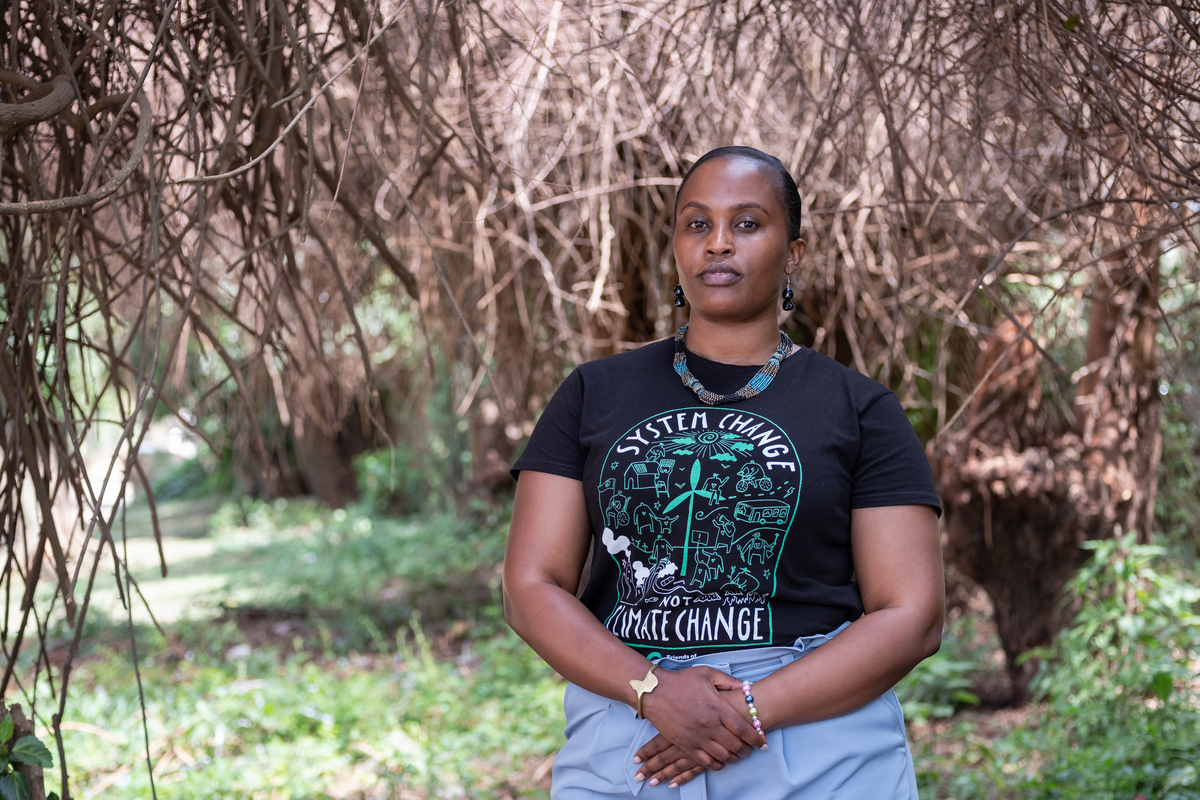
In western Uganda, Sostine Namanya grew up with the real impact of climate change on women. In rural areas of Mbara, in western Uganda, droughts are a dangerous time for women. They have to travel further and further distances to collect water. But the path to the indispensable source of livelihood puts them at higher risk of sexual violence. If the journey to the well is longer, dinner at home is also delayed. Sostine Namanya, 35, knows that women then become victims of their violent partners.
She has grown up with the reality of how climate change worsens the position of women in patriarchal societies. Especially in rural areas, where 75 percent of Uganda’s population lives and more women than men are involved in agriculture. Namanya wants to improve her situation as a gender officer at NAPE, an environmental NGO.
In a charged atmosphere where security personnel pull her and her team members out of organised climate events and accuse them of inciting communities, it is not easy to move forward. Even though Namanya draws a lot of strength for her work from her anger about injustice, the headwinds can make her doubtful.
Now she is bringing together women from rural communities through events on climate issues, and wants to build a network. “Women’s power is essential for change,” says Namanya - but she needs comrades-in-arms.
Evelyn Acham Co-founder of a climate movementThe police arrested her at the climate protest. But she will not be intimidated.
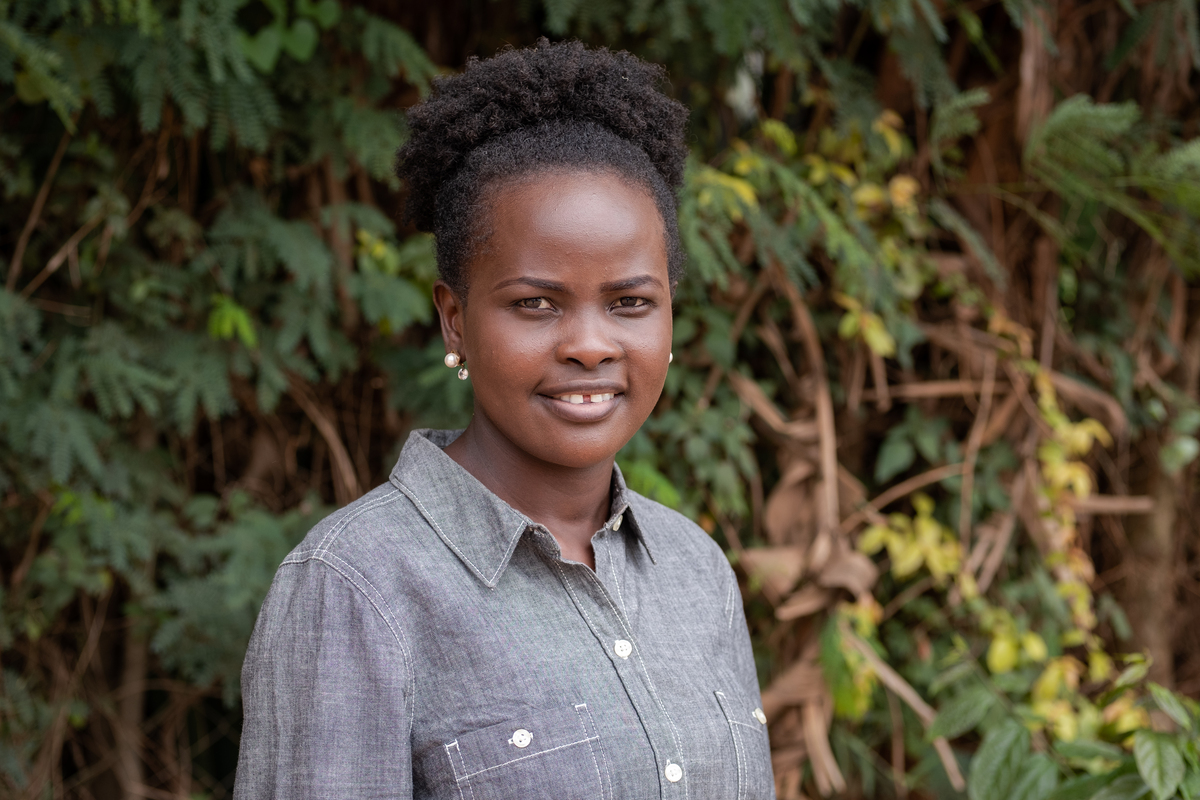
Evelyn Acham could feel the changes before she knew the reason. In her home village in eastern Uganda, the boys were responsible for looking after the cattle. The dry seasons became longer, the distances to the next watering hole longer, there was only one spring for 1000 animals. “There were fights over the water,” the now 30-year-old recalls at a meeting in a hotel in Kampala. Droughts and floods, generally more unpredictable weather - these are the consequences of the climate crisis in Uganda. In a district like Pallisa, where people live from agriculture, this is particularly noticeable.
Evelyn Acham’s family had a banana plantation that ensured the survival of the ten siblings. “It is now too dry for bananas,” she says. The same goes for oranges, mandarins and mangoes. The fruits no longer grow the way they used to. Acham only realised later that these changes had something to do with the climate crisis. After graduating, she began to study the consequences of global warming more intensively - together with her friend Vanessa Nakate, who has since become one of the leading voices of the climate movement in Africa. “It was only then that I realised that this is one of the biggest challenges facing Uganda.” With Nakate, she founded the Rise Up Movement - a movement that gives activists from Africa a platform to share their stories and experiences.
Since then, Acham has been soaking up all the information she can get on the subject. In online courses and in workshops with fellow campaigners from Europe, Asia, the USA and South America. She knows the resolutions of the last climate summit in Glasgow and the key findings of the latest report by the Intergovernmental Panel on Climate Change (IPCC). She has just been to a conference on climate change, and during the break she takes time to talk about activism, which is how she spends much of her free time. “This is a lifelong struggle,” she says. Acham wants to fight it on behalf of those who cannot do so themselves. The people who are particularly vulnerable, as in her home region in Pallisa.
Acham thinks that too little is said about climate change in schools. Many people put their childrens’ well-being at the forefront of their minds, that’s all they are interested in. Evelyn Acham wants to change that, she wants to create awareness for the climate crisis. Via social media, in personal conversations - or through visible protest. However, this can also come at a price. Last year, Acham stood in front of the well-guarded parliament in Kampala. The city, with its dense car and motorbike traffic, was once again suffering from smog. Holding a placard, Acham protested against the air pollution
It did not take long before several policemen arrested her and her comrade-in-arms. They took their mobile phones and asked them why they were opposing the government. They threatened that they could make people disappear. Three quarters of an hour later, they were allowed to leave. Such attempts at intimidation do not leave her unscathed. Protest is especially frowned upon when it is directed at projects such as the construction of the oil pipeline, which is co-operated by the government. For a while, she and her friends held back on social media with their campaign against the EACOP project. But now she has found her strength again, says Acham: “I can’t keep quiet.
Miriam Talwisa Agricultural expert She wants to better connect farmers in the fight against climate change - and involve women in particular.
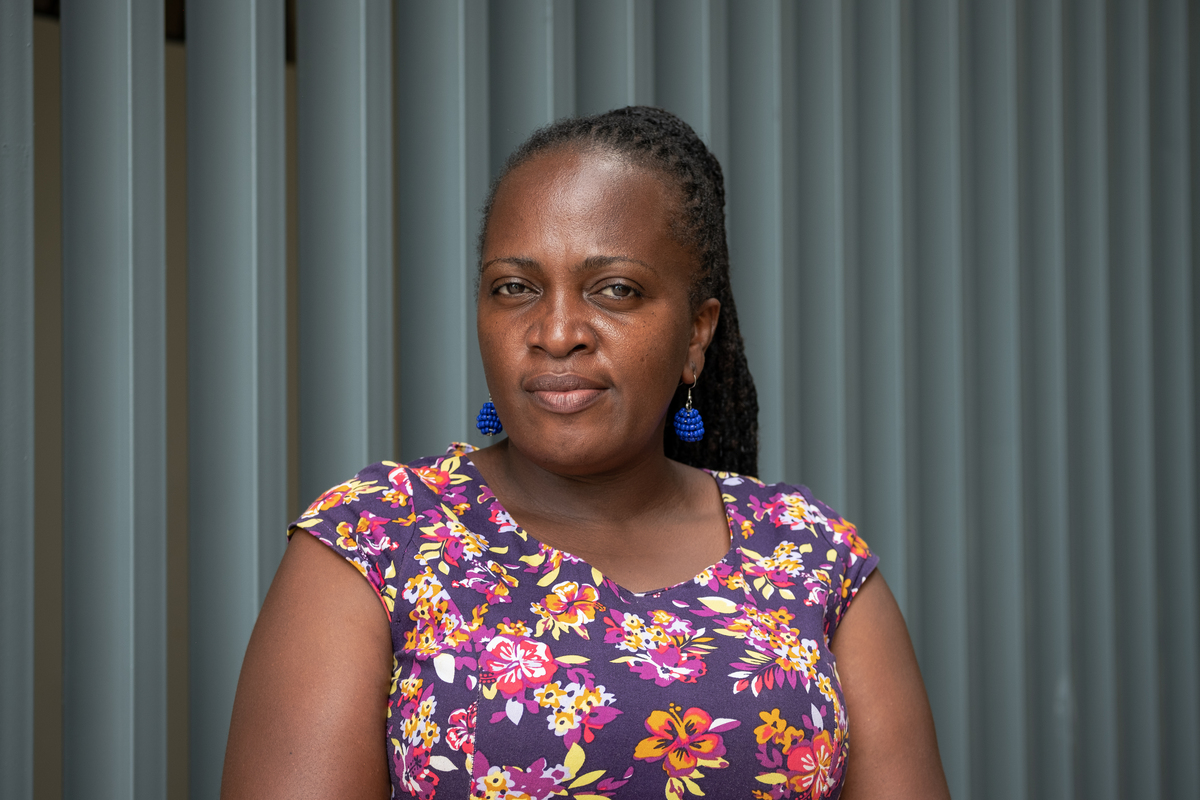
Normally, it is the time of year when maize and beans are sown in Uganda. But not in March 2022, says Miriam Talwisa. She is at a conference with farmers and farmers’ associations in Uganda’s capital Kampala. It has hardly rained in large parts of the country for weeks. Yet the rainy season should actually be just beginning. “You can already see many of the consequences of climate change now,” she says.
In Uganda, almost 70 percent of all people work in agriculture, and 43 percent of all food consumed by Ugandans is home-grown. Even employees often grow additional food to feed themselves despite low salaries. This means that if the harvest fails, it is more than just an economic problem. It means sudden famine.
Because this is the case, Mariam Talwisa has decided to work on how to better help farmers stop climate change. She is working with farmers, meteorologists and local organisations to find solutions on how to respond to the changing weather, for example, through planting different crops or better planning.
Through local community shops in the communities, so-called Farmers Agri-Met Village Advisories Clinics, this exchange is made possible, but also through manuals and better weather data for the local areas from the Uganda Meteorological Authority. It is also about listening more to the local people, she says.
Before she started this small-scale work, Talwisa worked at the Climate Action Network, where she helped develop policy guidelines and rules against climate change. “But often these policies had far too little information from those affected on the ground,” she says. So many of the rules didn’t work either. Yet local farmers often found their own solutions, which they could pass on to other farmers if they were networked.
She says that women play a key role in this, which is still far too little recognised. In most families, they do most of the work in the fields. In Uganda, however, 85 percent of the land belongs to men, the traditional heads of families. As a result, the women have to do the work, but have little say in what is grown.
Trees, for example, which take a long time to grow but then usually bear a lot of fruit, are often not allowed to be planted by women, she says. Because planting a tree is considered a mark of ownership of one’s own land. So some men forbid their wives to do so. “Yet it is also the women who cook,” says Talwisa: “That is why they usually know much better which plants make sense to grow in order to feed the family.” If we want to learn to live with climate change, we have to learn to involve women better.
Faith Kwagala
Climate activist When she flies, it's for a more sustainable world.
In Europe, she is being heard.
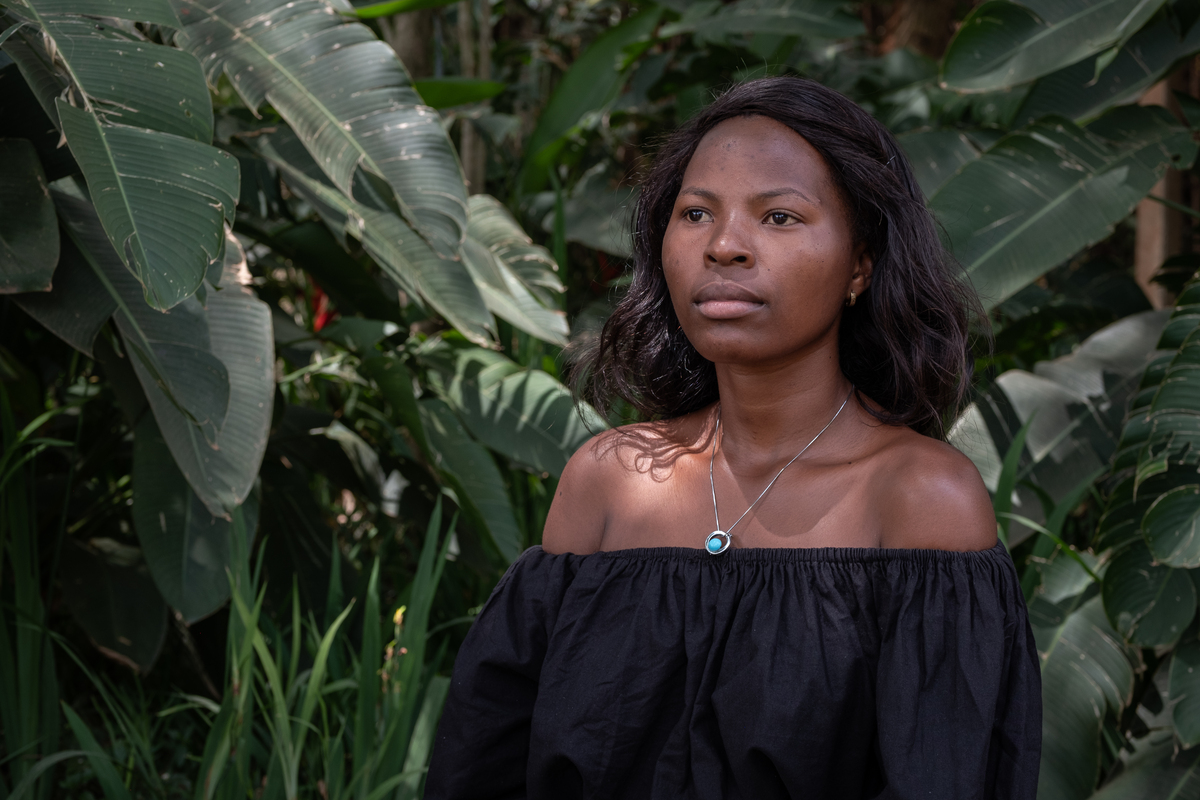
At the beginning of this year, Faith Kwagala flew for the first time. From Uganda to France. 6,200 kilometres. Almost a tonne of CO² just on her, ten times what people in Uganda emit on average per year. Exactly the kind of emissions she actually wants to prevent. But this flight was important to her. Kwagala was invited to the city of Grenoble, at the foot of the Alps. It was to attend the opening ceremony of the Environmental Capital 2022, but mainly to network with other international climate activists. She was also there to address the mayor. “A privilege”, as she says.
Because it meant nothing other than that finally the concerns of those most affected by climate change would be heard by those most responsible for it. Face to face.
Kwagala is an activist with the Rise Up Movement, a movement that gives activists from Africa a platform to share their stories and experiences. While in Germany even students take to the streets for Fridays for Future or Extinction Rebellion, it is not so easy in Uganda. Their fear of being arrested is too great, as has already happened to their fellow campaigners. One of the longest pipelines in the world is currently being planned and built in Uganda. The East African Crude Oil Pipeline. For security reasons, Kwagala only mobilises in Uganda with pictures, hashtags and videos. But in France, she now saw her chance. And joined a real protest in front of a Total petrol station.
The media attention was huge, thus she hopes that her trip could yet help to stop the project. Those responsible are still stuck in the past, says Kwagala. The pipeline cannot save Uganda’s future, on the contrary. Climate change is already one of the biggest threats to the country. Kwagala therefore plants fruit trees in her home country. Because 40 percent of the people farm to feed themselves. Fruit trees like mango, jackfruit or avocado not only have the advantage of feeding many people, but they also absorb a lot of CO₂. She explains in courses how to reduce greenhouse emissions. “If we do nothing in the end, it will cost us everything,” she is convinced.
Nevertheless, Kwagala would fly again. For the right cause. She wants to be heard. Representative of even smaller voices.
Diana Nabiruma Climate lobbyist She worries that Uganda's communities are slipping into crime because of oil exploration.
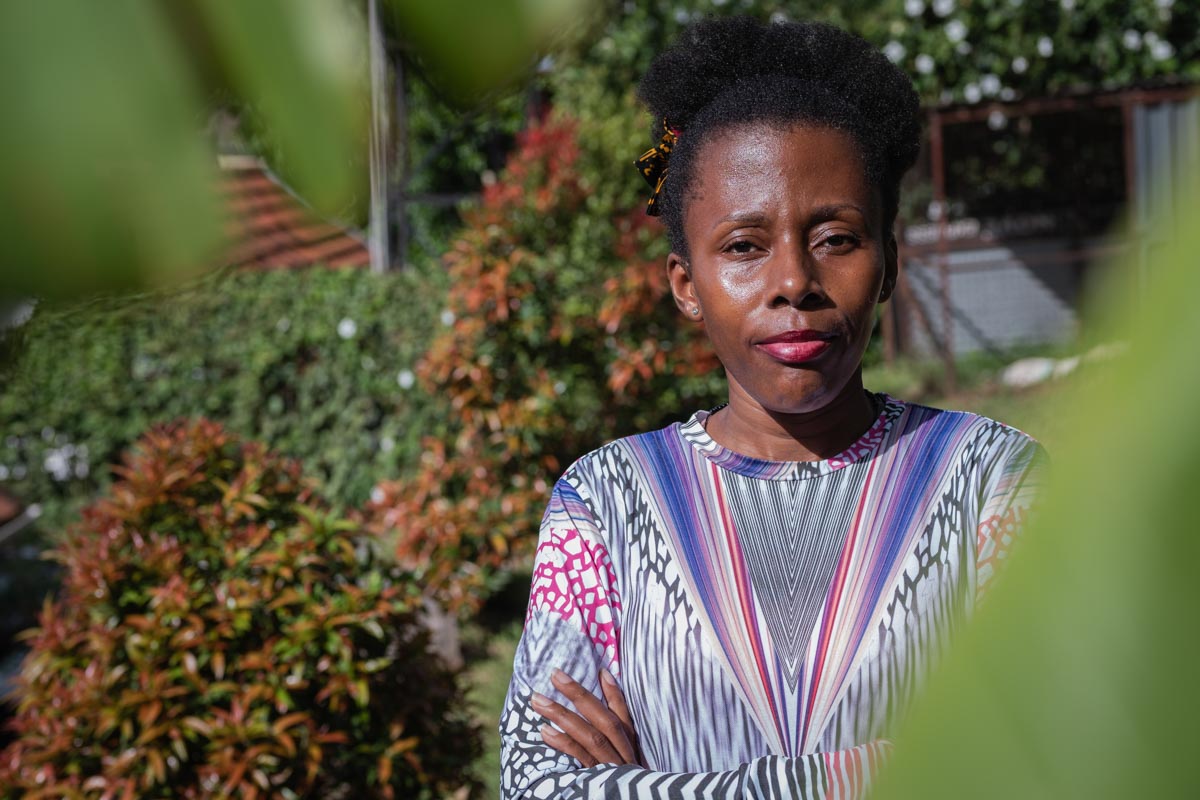
Diana Nabiruma actually only wanted to find out about the environmental consequences of oil production in Uganda when she found herself surrounded by weapons in Nigeria.
Nabiruma felt too little informed by the Ugandan government about dangers from oil pollution when the Ugandan government distributed licences for oil production. To see for herself the environmental consequences, she went to Nigeria - “the oil pollution capital of the world” according to the BBC - in August 2019. The communications expert for the Africa Institute for Energy Governance, which aims to influence energy policy through policy research and advocacy, visited oil fields in the Niger Delta.
When armed men got on the bus with her, she was firmly convinced that she was being kidnapped, she says in the video call. The weapons were supposed to protect her from being kidnapped. It is not uncommon for visitors to the oil fields to be taken hostage by local residents. Oil production has polluted the region so much that whole communities can no longer make a living from their agricultural work. Crops fail, fish no longer swim in the waters. Some then become criminals and secure their livelihood through ransom. For Nabiruma, her experience on the bus - and the environmental destruction in Nigeria - is a harbinger of what Ugandan communities could face upon the construction of the EACOP oil pipeline.
That people slipped into criminality, she understands, says Nabiruma. She understands if the residents saw no other option when their livelihoods fell away. After all, she says, everyone just wants to live a good life in good health. But Nabiruma thinks that is utopian when the environment and nature are so polluted.





